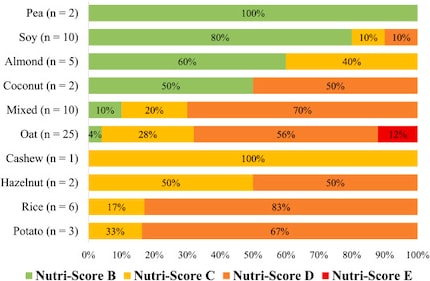
News + Trends
Most people want them, but many don't understand them: food labelling
by Debora Pape

Plant-based milk alternatives often contain a lot of sugar or unnecessary additives. This is shown by a study. It also presents ways in which the nutritional quality could be improved.
There are good reasons to avoid cow's milk and opt for alternatives: rejection of animal suffering, lactose intolerance and, last but not least, concerns about the high greenhouse gas emissions caused by milk production. Flavour can also be a reason: almond or coconut flavoured foam gives your cappuccino a new twist. However, anyone who assumes that plant-based alternatives are necessarily healthier than cow's milk is often wrong.
The new Swiss study «Transforming plant-based milk alternatives for better health» looks at 66 milk alternatives from 14 brands on the domestic market, such as those made from oats, soya, almonds and coconut. The aim of the study is to identify ways to improve the nutritional quality of plant-based drinks. To this end, the current status was first analysed.
The result: while milk alternatives are not unhealthy per se, the nutritional quality of many products leaves a lot to be desired compared to cow's milk. However, according to the researchers, it could be significantly improved without much effort. Incidentally, the study does not mention brands or product names as it is not a product test.
The research team used the ingredients list to check the Nutri-Score, which uses an algorithm to categorise foods on a scale. The assessment is based on the calorific value, sugar and salt content and the proportion of saturated fatty acids, among other things. You can find out more about the calculation here.
A is the best value, E the worst. This is intended to provide consumers in the supermarket with a rough comparison and decision-making aid.
52 per cent of the drinks tested are in the B and C categories (26 per cent each), 44 per cent are classified as D and four per cent as E. By comparison, cow's milk is classified as C for whole milk and B for the low-fat variant.
According to the Nutri-Score classification, these products perform best in category B:
At the bottom end of the scale is one of 25 oat drinks (E). In the second worst category D ranked

The best value A is reserved exclusively for water in the drinks category.
Further findings show that the Nutri-Score does not provide a complete picture.
Plant-based drinks are often categorised as ultra-processed foods. These are industrially manufactured products that contain many additives and are heavily modified during processing.
The study identified that five of the products reviewed - namely all coconut, cashew and pea drinks - are highly processed. However, the good Nutri-Score rating of pea and coconut drinks does not reveal the high level of processing. In contrast, all twelve potato and soya drinks use unprocessed plant-based ingredients. However, these contain more sugar.
Sugar was added to 21 per cent of the drinks. In addition, there is a high proportion of natural sugar, which is already present in the plant-based source or is created during processing. Rice and oat products therefore contain high amounts of sugar. The study notes that products with less sugar tend to contain more additives.
These are contained in 47 per cent of the products tested. The team identified a total of 51 additives, including acidity regulators, stabilisers, emulsifiers and thickeners. The addition varied depending on the plant source. For example, stabilisers were particularly used in coconut, hazelnut, almond and soy milk alternatives, while acidity regulators were mainly used in potato, pea and oat products. In contrast, milk alternatives from mixed plant sources do not contain any additives.
An additional problem with plant-based drinks is that they contain fewer nutrients than cow's milk, as they consist largely of water. For example, calcium and vitamins are added to improve the nutritional value, while the protein content and quality is lower.
The study emphasises that manufacturers have many opportunities to improve the nutritional quality and therefore also the Nutri-Score. The focus is on the sugar content. This could be reduced by several grams per 100 millilitres: a high level of added sugar is not necessary and changes to the manufacturing process can reduce the natural sugar content. According to the report, oat and soya drinks offer particularly high potential for sugar reduction.
The good news for manufacturers is that an increasing demand for natural and healthy products can be recognised on the market. The researchers also see great potential for improvement in the development of less processed products. Rice, oat and mixed-source drinks would therefore benefit most from more unprocessed plant sources.
The addition of many additives is also often unnecessary: according to the study, some milk alternatives can do without up to three additives. The addition of protein and fibre, on the other hand, can lead to an improvement in the Nutri-Score.
?
It remains to be seen whether manufacturers will react and change the composition and manufacturing process of their products. It is clear that in addition to flavour, there are also major differences in the manufacturing processes, nutritional values and the use of additives in milk alternatives. Until then, you should inform yourself about the advantages and disadvantages of your favourite plant-based drink. «When in doubt, enjoy in moderation» is good advice, as with all processed foods.
Feels just as comfortable in front of a gaming PC as she does in a hammock in the garden. Likes the Roman Empire, container ships and science fiction books. Focuses mostly on unearthing news stories about IT and smart products.
Interesting facts about products, behind-the-scenes looks at manufacturers and deep-dives on interesting people.
Show all
Background information
by Debora Pape

Background information
by Coya Vallejo Hägi

Background information
by Moritz Weinstock